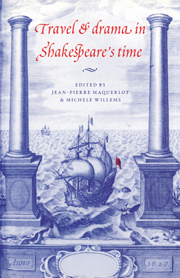Book contents
- Frontmatter
- Contents
- List of contributors
- 1 Introduction
- 2 Foreign relations in Jacobean England: the Sherley brothers and the ‘voyage of Persia’
- 3 ‘The naked and the dead’: Elizabethan perceptions of Ireland
- 4 The Elizabethans in Italy
- 5 Tragic form and the voyagers
- 6 Nationality and language in Thomas Kyd's The Spanish Tragedy
- 7 Marlowe's Argonauts
- 8 Pirates and ‘turning Turk’ in Renaissance drama
- 9 The wrong end of the telescope
- 10 ‘Travelling hopefully’: the dramatic form of journeys in English Renaissance drama
- 11 ‘Seeing things’: Amazons and cannibals
- 12 Industrious Ariel and idle Caliban
- 13 The New World in The Tempest
- 14 ‘What's past is prologue’: metatheatrical memory and transculturation in The Tempest
- 15 Lope de Vega and Shakespeare
- Index
10 - ‘Travelling hopefully’: the dramatic form of journeys in English Renaissance drama
Published online by Cambridge University Press: 22 September 2009
- Frontmatter
- Contents
- List of contributors
- 1 Introduction
- 2 Foreign relations in Jacobean England: the Sherley brothers and the ‘voyage of Persia’
- 3 ‘The naked and the dead’: Elizabethan perceptions of Ireland
- 4 The Elizabethans in Italy
- 5 Tragic form and the voyagers
- 6 Nationality and language in Thomas Kyd's The Spanish Tragedy
- 7 Marlowe's Argonauts
- 8 Pirates and ‘turning Turk’ in Renaissance drama
- 9 The wrong end of the telescope
- 10 ‘Travelling hopefully’: the dramatic form of journeys in English Renaissance drama
- 11 ‘Seeing things’: Amazons and cannibals
- 12 Industrious Ariel and idle Caliban
- 13 The New World in The Tempest
- 14 ‘What's past is prologue’: metatheatrical memory and transculturation in The Tempest
- 15 Lope de Vega and Shakespeare
- Index
Summary
We tend rather glibly to talk of a play as a journey. The critical cliché to describe the central character's progress through an action suggests an easy compatibility between the form of a drama and a bit of travelling. Even the word ‘progress’ carries, to the ears of Renaissance scholars, the overtones of royal wanderings usually to the accompaniment of interminable speeches of welcome by figures in a variety of mythological and allegorical guises. Fletcher's The Sea- Voyage ends with Sebastian defining what constitutes a good trip:
when a while
We have here refresh'd ourselves; we'll return
To our several homes; and well that voyage ends,
That makes of deadly enemies, faithful friends.
But for all the play's eerie and complex rethinking of The Tempest, it is not interested in charting a voyage so much as an arrival at a point of cultural and geographical limbo, an opposition of two islands, sterile and fertile, of enforced Amazonianism and masculine greed. Sebastian himself spends most of the play off the island, having escaped by stealing the boat that brings the others to his isle of shipwrecked misery, as if Prospero had used the availability of Alonso's ship to nip back to Milan and abandon the others to their several fates. The hungry confrontation with a hostile environment and the impossibility of suppressing heterosexual desire are the play's main concerns, not the route by which someone gets to that space.
- Type
- Chapter
- Information
- Travel and Drama in Shakespeare's Time , pp. 160 - 178Publisher: Cambridge University PressPrint publication year: 1996
- 5
- Cited by



